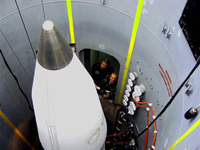U.S. House of Representatives committee hinders building missile-defense sites
A U.S. House of Representatives committee voted on Wednesday to turn down more than 50 percent of the funds sought by the Bush administration to start building missile-defense sites in Poland and the Czech Republic.

The Democratic-controlled House Armed Services Committee cut $233 million in research and development and $140 million for military construction projects, pending approval from the two countries for the projects, among other things.
The action was part of the committee's version of a $540 billon-plus fiscal 2009 defense policy bill. A Republican-led effort to restore the cuts failed along party lines, despite an appeal to lawmakers from Defense Secretary Robert Gates.
The Senate Armed Services Committee agreed two weeks ago to fully fund President George W. Bush's request for more than $710 million to start deploying up to 10 interceptor missiles in Poland and a tracking radar in the Czech Republic.
Eventually, differences between the House and Senate bills must be ironed out and signed by the president to take effect.
Gates, in a letter to the House panel's top Democrat and Republican, said full funding without restrictions would induce Poland and the Czech Republic to conclude the necessary bilateral missile-defense deals with the United States.
It also would send "a strong message to Iran that the United States and NATO are serious about developing effective missile defenses, and to Russia that there is bipartisan support for going forward with or without Moscow's cooperation," Gates wrote in the letter dated April 30.
Bush administration officials have argued the European sites are needed to guard against perceived missile threats from Iran . Russia has opposed the U.S. plan on the ground it would undercut its nuclear deterrent. Gates said the administration would keep on soothing Russian concerns and "seek its involvement."
The House panel rejected a Republican push for a $5 million study on the "feasibility and advisability" of developing a space-based leg of the emerging U.S. antimissile shield. The Senate Armed Services Committee authorized such a study by an independent group in its version of the 2009 defense authorization bill.
Ellen Tauscher, a California Democrat who heads the House's strategic forces subcommittee, said two previous studies found putting weapons in space would be "impractical, technically challenging and extremely expensive."
The House panel voted along party lines to cut $100 million from research on a planned "multiple kill vehicles" being developed by Lockheed Martin Corp with help from BAE Systems Plc. The system is designed to pack more firepower into a single booster rocket.
Overall, the committee approved $10.2 billion for missile defense programs, the Pentagon's costliest current weapons outlay $719 million less than sought by Bush but $212.6 million about the current level.
Subscribe to Pravda.Ru Telegram channel, Facebook, RSS!


